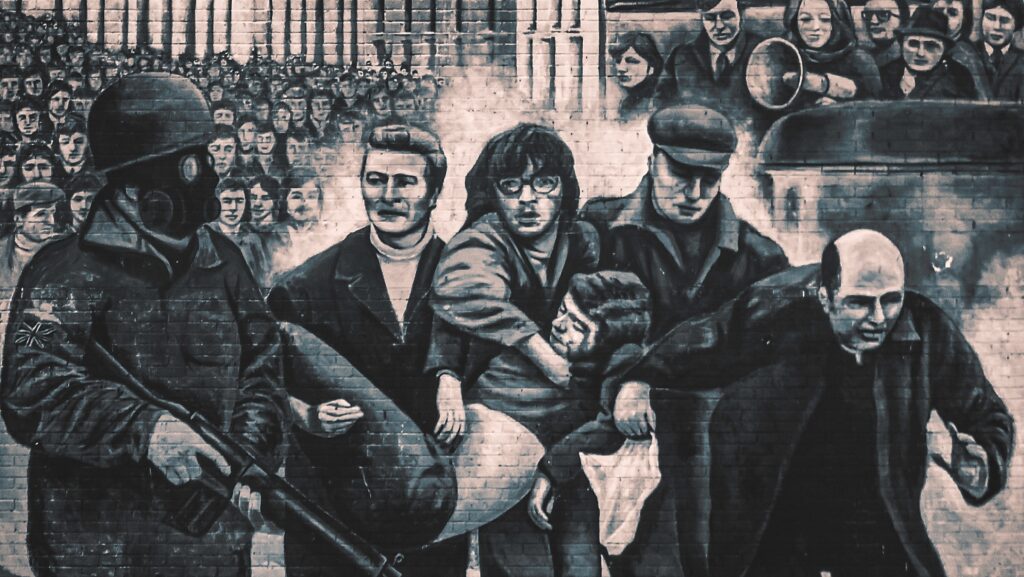Nora Redmond
The recently enacted Northern Ireland Troubles Act has been met with opposition for prioritising the protection of suspected offenders, 25 years on from the signing of the Good Friday Agreement.
What is the Northern Ireland Troubles Act?
The Northern Ireland Troubles (Legacy and Reconciliation) Act (2023) has officially come into law after receiving Royal Assent on September 19th.
The controversial legislation grants conditional amnesty to those suspected of killings during the Troubles in exchange for information and assistance of the Independent Commission for Reconciliation and Information Recovery in their investigations.
The legislation is likely to affect hundreds or possibly thousands of cases related to the Troubles.
The bill sets out to give immunity to groups including British Army veterans and paramilitary groups. Consequently, it will stop inquiries into crimes committed during the Troubles and halt all examinations into Troubles-era crimes in Britain.
In total, over 3,700 people were killed during the 30-year conflict. More than 47,000 additional people are estimated to have been injured.
Amnesty International reports that “in most cases no one has ever been held responsible.”
Reactions to the Troubles Act
The bill has been met with widespread criticism, as opponents say it will halt justice for victims and relatives of those involved in the Troubles,
Democratic Unionist Party Leader Sir Jeffrey Donaldson wrote to Rishi Sunak in June, urging the Prime Minister to scrap the bill.
In his letter, Sir Jeffrey said stopping Troubles-related cases would cause “irreparable harm to the foundations of the criminal justice system in the United Kingdom and its standing throughout the world.”
Vice President of Sinn Féin, Michelle O’Neill, said the only purpose of the legislation is “to conceal the truth and protect British state forces.”
She stated that the bill is “anti-democratic” and “unjust.”
“Survivors and their families have expressed concern that the legislation protects perpetrators.”
The legislation has also been the subject of strong condemnation from international human rights organisations.
United Nations experts have urged Parliament to reconsider its approach to better comply with national and international human rights standards. They warned the Northern Ireland Troubles Act “would thwart victims’ right to truth and justice.”
The legislation was first introduced in July 2021 under PM Boris Johnson. He argued the legacy proposals would “enable the people of Northern Ireland to move forward” from the Troubles.
Veterans’ groups have welcomed the protection that the bill offers to veterans who face the pressure of investigations.
The Northern Ireland Legacy Act has received Royal Asset, a significant milestone in effectively and fairly addressing the legacy of the Troubles. The new approach will focus on information recovery, reconciliation, and memorialisation for all. pic.twitter.com/3VP8hY5c0C
— Rt Hon Johnny Mercer (@JohnnyMercerUK) September 21, 2023
Survivor responses to the Troubles Act
Survivors and their families have expressed concern that the legislation protects perpetrators. Additionally, the amnesty was introduced without any consultation with victim groups.
Raymond McCord, who’s son was killed by Loyalists in 1997, told BBC News that he would pursue legal action against the UK government after the bill was passed.
He said: “My next step is taking the government to court, [they] simply don’t care about truth and justice.”
The families of State Violence challenging the British Government Northern Ireland Troubles (Legacy & Reconciliation) Act 2023 https://t.co/hkyLwR7tei
— Madden & Finucane Solicitors (@madden_finucane) September 15, 2023
As of Friday, six families have launched a legal challenge in Belfast against the legislation.
Madden & Finucane Solicitors lodged judicial review proceedings with the High Court in Northern Ireland on behalf of the six families whose relatives were killed during the Troubles:
- Billy Thompson, son of Kathleen Thompson, was fatally shot by a member of the Royal Green Jacket regiment in Derry in November 1971.
- Jonathan McKerr, son of Gervaise McKerr, was shot dead near Lurgan in November 1982 when members of a Royal Ulster Constabulary (RUC) firearms unit fired over 100 rounds into a car he was driving, killing Mr McKerr and his two passengers.
- Una Eakin, widow of Gerard Casey, who was killed by loyalist paramilitaries in north Antrim in April 1989.
- Linda Hewitt, sister of Sam Marshall, who was murdered by loyalist paramilitaries in Lurgan in March 1990.
- Teresa Jordan, mother of Pearse Jordan, who was fatally shot by the RUC in Belfast in November 1992.
- Eamon Cairns, father of Gerard and Rory Cairns, who were killed in their home by the mid Ulster UVF in October 1993.
The solicitors will be lodging applications for families who are directly impacted by the Troubles Act to the European Courts of Human Rights in the upcoming weeks.
The Irish government is awaiting legal advice from Attorney General Rossa Fanning to decide whether to take an interstate case against the UK over the passing of the legacy bill.
It would be the second taken by Dublin against London, with the first case involving the use of torture sanctioned by the UK government in Northern Ireland in 1971.
READ NEXT:
-
AUSTRALIAN MINING TYCOON THREATENS TO PULL UK INVESTMENT OVER OIL RUSH
-
MINISTERS ACCUSED OF ENVIRONMENTAL CRIMES OVER OIL DRILLING
-
BIBBY STOCKHOLM: THE STORY BEHIND THE DISASTER
Featured image courtesy of K. Mitch Hodge on Unsplash. No changes were made to this image. Image license found here.

